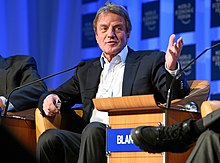Bernard Kouchner


Bernard Kouchner (born November 1, 1939 in Avignon ) is a French politician and doctor . He is co-founder of Médecins sans Frontières (MSF, Doctors Without Borders ), Médecins du Monde (MDM, Doctors of the World ) and was French Foreign Minister and Minister for European Affairs in the government of François Fillon from May 18, 2007 to November 14, 2010 . In the second half of 2008 he was also President of the Council of the European Union .
Life
Kouchner is a gastroenterologist . The son of a Jewish father and a Protestant mother began his political career as a member of the Communist Party , from which he was expelled in 1966. In 1968 he worked as a doctor for Secours médical français (SMF) in the Nigerian province of Biafra . The civil war there became a key experience for Kouchner. In view of the suffering and hunger of the population and the cruelty of the Soldateska, the young doctor did not want to adhere to the silence required by the SMF. For him, this was not compatible with the Hippocratic oath . “Impartiality yes, neutrality no.” So the humanitarian action also served to make the oppression and the crimes visible.
In 1971, together with other committed medical professionals , he founded the non-governmental organization Médecins sans Frontières , which emerged from the French Secours médical français . In addition, Kouchner got into disagreement with the director of MSF Claude Malhuret and resigned from MSF in 1980 to found the second aid organization Médecins du Monde (MDM). Kouchner's “French doctors” soon became a household name in conflict and crisis areas around the world, as did his credo: the right, yes, the duty to intervene in order to combat the misery of people all over the world. “The right to humanitarian intervention (droit d'ingérence humanitaire) comes first. In case of doubt, even before state sovereignty. "
In 1977, like around sixty other intellectuals, he signed an appeal for the decriminalization of pedophilia , which appeared in the Liberation and Le Monde newspapers. The appeal was initiated by the pedophile writer Gabriel Matzneff .
He advocated a long-term concept of humanitarian interference. In 1993 he therefore founded the Fondation pour l'action humanitaire . Although he was not a member of a political party at the time, he successfully ran for the European Parliament in 1994 on Michel Rocard's list . In 1995 he joined the Parti radical de gauche , whose press spokesman he was. At the same time, he advocated the social security reforms of the Gaullist minister Alain Juppé . He headed the Club Réunir (association) and was close to both Michel Rocard and Lionel Jospin .
From 1999 to 2001 the Secretary General of the United Nations Kofi Annan sent him to Kosovo as special envoy and head of UNMIK . Kouchner was personally friends with the Brazilian diplomat and UN High Commissioner for Human Rights Sérgio Vieira de Mello .
He is the author of a number of books on mainly medical, humanitarian and political subjects. His brother Jean Kouchner is the director of the communist Paris radio station TSF. In his first marriage, Bernard Kouchner was married to Évelyne Pisier , who after her divorce married the European MP of the Socialist Party and constitutional lawyer Olivier Duhamel . Kouchner's current partner is the journalist Christine Ockrent .
The so-called loi Kouchner (Kouchner law), officially suspension de peine pour raison médicale , provides for an application for release from prison for prisoners whose state of health is incompatible with prison. The regulation led to a public controversy , particularly through its application in the case of the war criminal Maurice Papon .
Immediately after Bernard Kouchner was appointed Foreign Minister of his Conservative government by President Nicolas Sarkozy in May 2007, the Parti Socialiste declared Kouchner's exclusion: “Anyone who joins this government,” proclaimed party leader François Hollande , “is a right-wing minister and cannot at the same time Belong to socialists. Kouchner is no longer a member of the Socialist Party. ” PS parliamentary group leader Jean-Marc Ayrault criticized that the“ opening ”promised by Sarkozy was limited to isolated poaching and Kouchner, who was a“ personality without borders ”and was now“ carefully under direct supervision des Elysée ”.
Kouchner has been working as a workstream leader for the Agency for the Modernization of Ukraine (AMU) since May 2015 . Its aim is to develop a modernization program for medical-humanitarian issues.
Political résumé
- from 1988 to 1992 State Secretary for Humanitarian Affairs
- Minister for Health from 1992 to 1993
- from 1994 to 1997 member of the European Parliament
- Minister for Health and Humanitarian Affairs from 1997 to 1999
- from 1999 to 2001 representative administrator of the United Nations in Kosovo
- Minister of Health delegated from 2001 to 2002
- from 2007 to 2010 Foreign Minister of the French Government of Prime Minister François Fillon
Web links
- "Sarkozy's Top Diplomat: undiplomatic Opposite" , New York Times , May 19, 2007
- Christopher Caldwell: Communiste et Rastignac London Review of Books , July 9, 2009
- Entry for Bernard Kouchner in the database of Members of the European Parliament
Individual evidence
- ↑ Pascale Hugues : It was forbidden to forbid. In: Die Zeit from January 25, 2020, p. 53.
- ↑ http://www.ots.at/presseaussendung/OTS_20150513_OTS0149/amu-team-beginnt-programm-arbeit-bild
| personal data | |
|---|---|
| SURNAME | Kouchner, Bernard |
| BRIEF DESCRIPTION | French doctor and politician, founder of Médecins sans Frontières and Médecins du Monde |
| DATE OF BIRTH | November 1, 1939 |
| PLACE OF BIRTH | Avignon |
